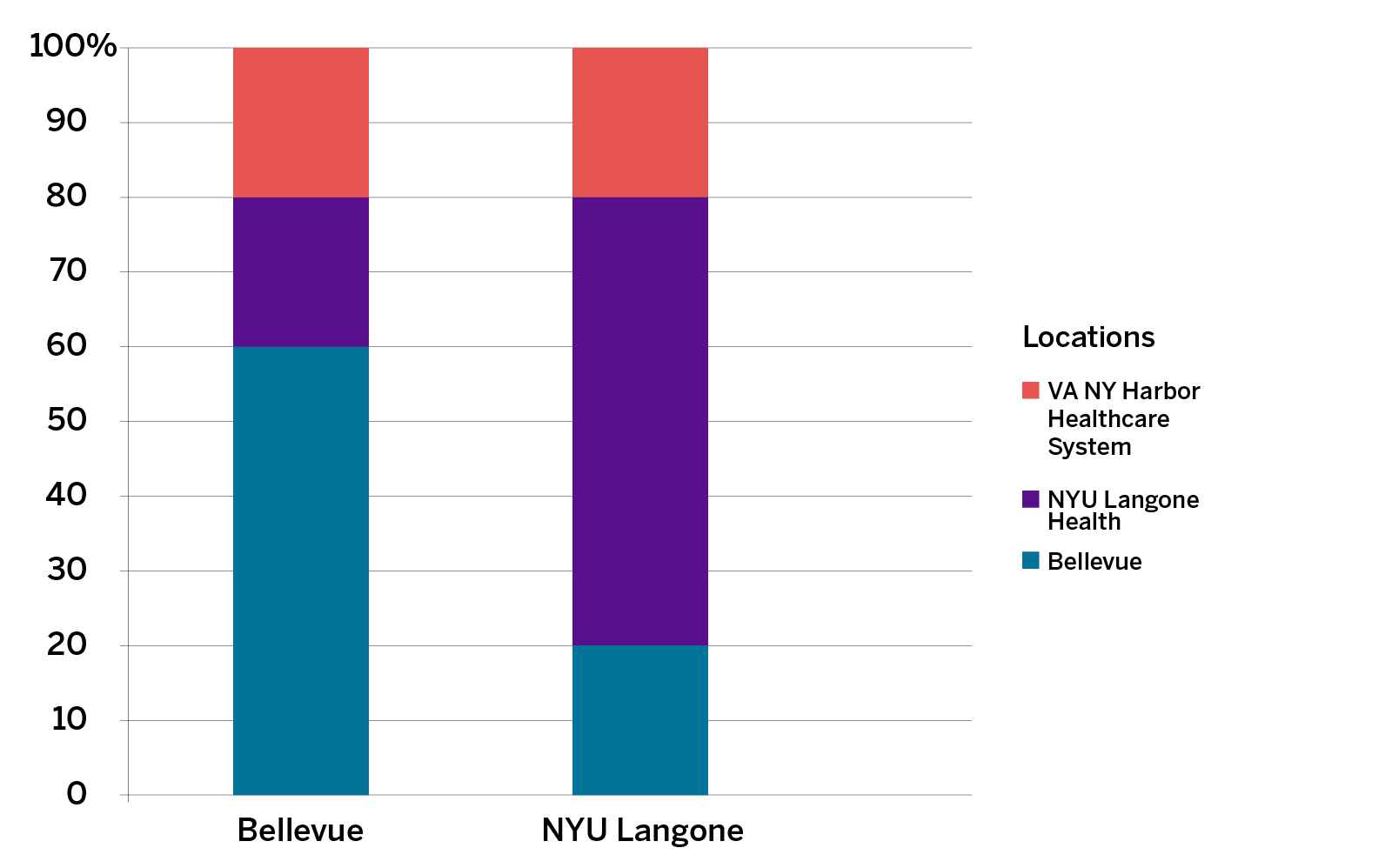
Categorical Medicine Residency Tracks
Students accepted to the Internal Medicine Residency program in NYU Langone’s Department of Medicine complete a three-year categorical medicine track that provides the training they need for board certification. As a categorical medicine resident, you care for patients with medically complex conditions in both inpatient and outpatient settings.
We offer two options for completing rotations—the Bellevue categorical medicine track and the NYU Langone categorical medicine track. The National Resident Matching Program (NRMP) code for each is as follows:
- Bellevue categorical medicine track NRMP—2978140C0
- NYU Langone categorical medicine track NRMP—2978140C3
This gives you the ability to choose the environment that you feel best suits your personal learning style. We believe that building communities of residents with common interest results in a richer environment for learning, feedback, mentorship, and academic pursuits.
Residents on either track complete their longitudinal outpatient experience at NYU Langone Internal Medicine Associates, NYC Health + Hospitals/Bellevue adult primary care clinic, or the VA NY Harbor Healthcare System primary care clinic in Manhattan.
Graduates of both tracks move on to fellowships in a wide variety of specialties, as well as to positions in hospital and general internal medicine.
Bellevue Categorical Medicine Track
If you choose the Bellevue categorical medicine track, you rotate at Bellevue, the flagship facility of NYC Health + Hospitals, for the majority of your inpatient clinical rotations. The remaining inpatient rotations are at Tisch Hospital, Kimmel Pavilion, and the VA NY Harbor Healthcare System.
With a more focused experience at Bellevue, residents work alongside physicians dedicated to the social mission of the city’s largest hospital, where no patient is ever turned away. Through rotations that balance autonomy and supervision, residents in the Bellevue categorical medicine track learn to care for the most complex patients across a variety of healthcare delivery systems.
Bellevue's long tradition of providing thorough and comprehensive training in internal medicine provide an outstanding foundation for any career you choose.
NYU Langone Categorical Medicine Track
With the NYU Langone categorical medicine track, you spend 60 percent of your inpatient time at Tisch Hospital and the Kimmel Pavilion and 40 percent at Bellevue and the VA NY Harbor Healthcare System. You experience greater exposure to pulmonary disease, organ transplantation, and inflammatory bowel disease in a tertiary referral center.
As part of the Firm System, NYU Grossman School of Medicine’s faculty mentorship program for medical students and residents, you develop longitudinal relationships with hospitalist faculty. Attending hospitalists who work with house staff have demonstrated passion and skill for teaching residents and medical students, and they rotate on house staff teams regularly. This means you work with many of the same attending physicians throughout your training and receive consistent feedback and professional development opportunities.
Residents on this track gain experience with a broad spectrum of diseases. By practicing at a tertiary care center that has expanded specialty care programs, residents also gain exposure to the latest transplant and subspecialty care teams, unique quality and patient safety programs, and value-based management programs. Members of the NYU Langone categorical medicine track also have the opportunity to conduct their continuity outpatient practice with a network of more than 3,000 private practice doctors who are affiliated with NYU Langone.

Postgraduate Year 1
During your intern year, or PGY-1, in the categorical medicine program, you complete inpatient and ambulatory care rotations. Inpatient rotations are on the general medicine services and the medical intensive care units at the three hospitals, as well as the coronary care unit (CCU) at Bellevue.
During non-inpatient weeks, interns work at their continuity clinics and participate in a variety of two-week electives that are available within our multihospital system and through other New York City health and medical clinics. Residents can pursue subspecialty rotations at any of our affiliated hospitals and outpatient settings, toxicology rotations, rotations with the city medical examiner’s office, or nonclinical electives focused on narrative medicine or healthcare technology.
Postgraduate Year 2
As part of your junior residency year, or PGY-2, you learn to lead a ward team and work more closely with attending physicians on both day-to-day and big-picture care decisions as well as oversee and teach interns and medical students.
You manage patient care with greater independence on night medicine rotations, with a focus on admitting undifferentiated patients at Bellevue and NYU Langone hospitals. You also gain more experience in intensive care medicine as the senior resident in the intensive care unit at the VA NY Harbor Healthcare System and at Tisch Hospital. Finally, you begin to pursue training opportunities along your chosen career path with more opportunities for electives and research.
Postgraduate Year 3
In your senior residency year, or PGY-3, you gain greater autonomy leading medical teams on the general medical services and in intensive care units at all three Manhattan hospitals. You also spend one month as a Bellevue medical consult, continue outpatient practice in your longitudinal primary care clinic, and have elective time to participate in our diverse elective offerings.
